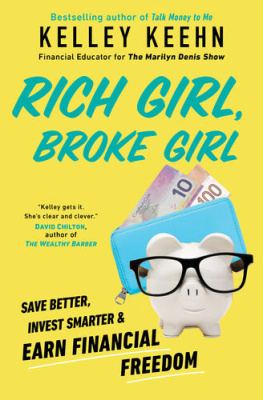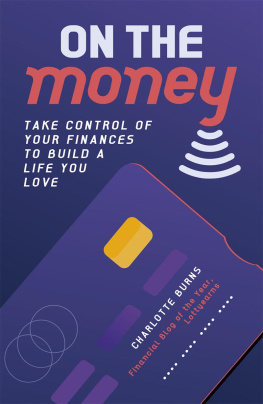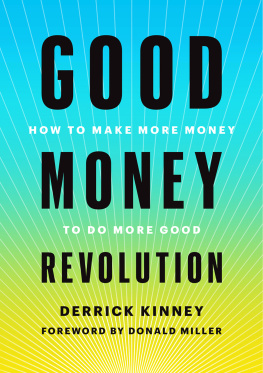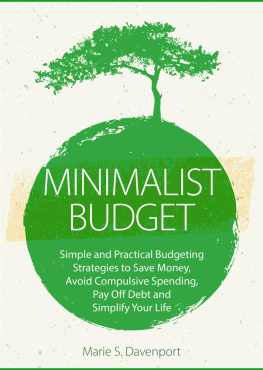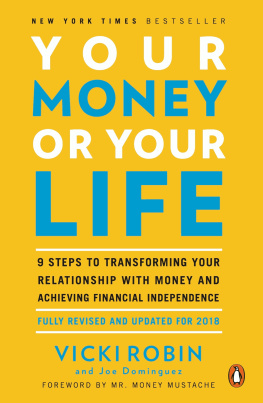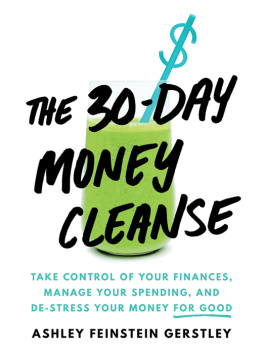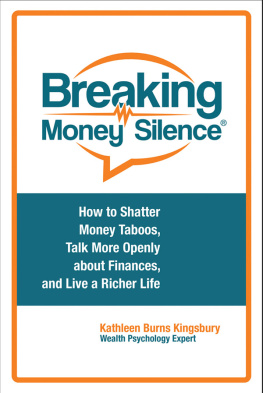Alex Holder is a freelance writer and consultant, who writes for ELLE, Grazia, Refinery29 and the Guardian among others. Her projects have been featured everywhere from the BBC to the New Yorker, while her campaign highlighting the gender pay gap went viral and helped change an actual law. She has been named one of Business Insiders 30 Most Creative Women globally and listed by the Evening Standard as one of todays 5 Inspiring Female Leaders.
Open Up
The power of talking about money
Alex Holder

First published in Great Britain in 2019 by Serpents Tail,
an imprint of Profile Books Ltd
3 Holford Yard
Bevin Way
London
WC1X 9HD
www.serpentstail.com
Copyright Alex Holder, 2019
The moral right of the author has been asserted.
All rights reserved. Without limiting the rights under copyright reserved above, no part of this publication may be reproduced, stored or introduced into a retrieval system, or transmitted, in any form or by any means (electronic, mechanical, photocopying, recording or otherwise), without the prior written permission of both the copyright owner and the publisher of this book.
A CIP catalogue record for this book is available from the British Library.
ISBN 9781788161879
eISBN 9781782835165
For Mark, who showed me another way to live.
A note from the author
Apart from named professionals and quoted experts, Ive changed the names and sometimes identifying features of people in this book. It turned out, at the time of writing, that to get people talking about money I had to offer them anonymity. Heres hoping that when theyve read this book theyll feel differently, and so will you.
WE NEED TO TALK
This is a book about our emotional relationship with money. Its full of conversations about money in everyday life, how we earn it, how we spend it and how it affects our relationships, friendships and career choices. Its for people who want to read a book about life, love, passion, awkward bosses and judgy friends; its probably not for people who want to read a book about the mathematical intricacies of finance. It might make you feel awkward, but it will never make you feel bored.
1
Look where not talking about money has got us
When I was terrible with money I talked about it. I complained about how far away payday was. I took pride in my reckless spending. I showed off to friends by withdrawing my last 20 from a cashpoint, then running into Tesco to buy two bottles of prosecco on my card before the bank realised Id taken all my money out. I was proud of how useless I was. Despite buying into the idea that the more money someone has, the better their life is, I felt strangely comfortable being bad with it. Reckless 20-something was a relatively uncomplicated character to play I was that person, the one who could get their ass in gear to book a flight to Berlin but who never opened a bill. Maybe, because I knew I wasnt earning the most money, I took refuge in bowing out of the competition and just being bad with money. There seemed less shame in staying broke than admitting money mattered.
There was a time when all my friends were open about money. When we were leaving university and trying to get our first jobs, we were all at the bottom of an imagined ladder and there was a pack mentality: us against the world. Sharing benefitted us all. In a couple of conversations wed know what to expect salary-wise by industry and entry-level position, which for a graduate was pretty invaluable information. Then as we slowly peeled away from each other and into different industries, some of us earning more, some earning less, money became a shameful subject. Perhaps its because people can literally be placed in a pecking order of highest earner to lowest that we stopped sharing what we earned. No one wanted to feel that they were in a league table with their friends and subject themselves to that kind of direct comparison, so money became a subject to skirt around. The more complicated our lives got, the more it solidified into a taboo subject. As we moved forward as adults, we faced decisions about money on our own: how much salary to ask for, what was a normal amount to pay in rent and whether we could really afford to go to that hen do in Barcelona.
The idea that our salary and the money in our bank account defines us that it represents our happiness, our power, our status, our popularity, our intelligence and our freedom is a hugely popular idea that we are constantly encouraged to believe. Its why we protect our salaries to such an extent; were warned that revealing our number might feel akin to public masturbation or broadcasting a therapy session, that if you spoke about your salary, people would know you too intimately. It was something I completely bought into as a young adult, yet as Ive got older Ive realised that salary isnt as defining as I first thought. That number doesnt indicate everything; its not your happiness or your popularity or any of those other identifiers. In fact, Ive seen people who earn less be happier than people who earn more. Ive learned to see that there are many currencies in life other than money: love, health, time, passion, purpose and freedom. Now I cant help but see how often we sacrifice the other currencies in pursuit of the only one we recognise to the decimal point money.
The social code dictating that we shouldnt talk about money was invented and perpetuated by the richest of society and trickled down to the rest of us; not talking about money is a privilege of the wealthy. For those who inherit wealth, discussions about money serve no purpose: their funds are secure, they dont need to talk about it. In contrast, if youre not rich then discussing money becomes critical to your survival: Where are the cheapest places to buy food? Where are the affordable places to live? Equally, if youre trying to make it in a new country, or a new city far away from your home town in New York, or London, or Paris you are going to want to discuss how the hell people afford rent. If youre a woman and suspect youre being paid less than your male colleagues, the only way youre going to find out is by asking. If youre a person of colour and think youre being charged more for your insurance, youre going to want to make it known. If you cant afford to eat at that restaurant you are going to have to tell your friends.
Weve basically allowed privileged people to determine how we talk about money. And as a result, were stuck in a place where talking about what we earn, spend and save is just too awkward. There is seemingly too much at stake to talk about money with any level of earnestness; everyone is too scared of embarrassing anyone else and too scared of feeling any shame themselves. Also, we dont know how to talk about it. We havent developed the vocabulary. How do you tell your mum youve got into more debt than you can handle? Why does sharing a money trouble sometimes feel like a request for funds when what you really need is an ear and some advice? Shame feels so intrinsically tied to money. But shame is an emotion we harbour in secret, and so its possible that if we were more open about money it wouldnt be allowed to fester to such a degree.
I was a sell-out. For years I worked in advertising, selling beer, junk food and clothes on credit to people who couldnt afford them. My job lacked purpose. It left me with little time to myself, and I often went years not exercising, but it did pay me a decent salary. Weirdly I feel more shame admitting I had money than I ever did about not having it. Talking about money when you have it feels crass and materialistic, like youre showing off, or suggesting that youre better than someone else two things my Northern upbringing taught me to scorn. I still feel uncomfortable admitting Im not in my overdraft, and I sometimes miss the student camaraderie of all being in the same skint boat, even though I appreciate Im lucky.
Next page

